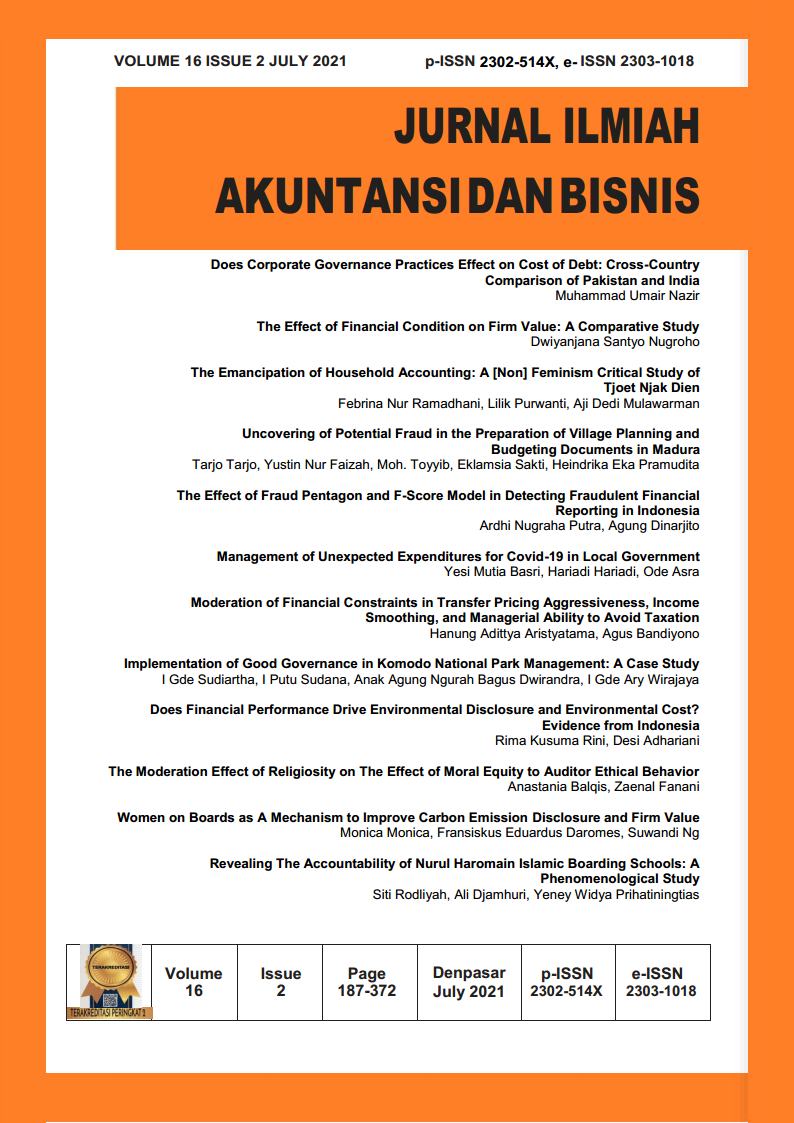The Effect of Fraud Pentagon and F-Score Model in Detecting Fraudulent Financial Reporting in Indonesia
Abstract
This study analyzes the effect of fraud pentagon and the efficacy of the F-score model in detecting fraudulent financial reporting in Indonesia. The sample used is the company’s annual report subject to Financial Service Authority (OJK) sanctions and a twofold comparative annual study from companies not subject to sanctions in the same reporting year and industry type. The sample was selected using a purposive sampling method. The data was analyzed using the logistic regression analysis. The test results prove that pressure, opportunity, and rationalization in the fraud pentagon can be used to detect bogus financial reporting. The results reveal that the F-score model is unsuitable for hypothesis testing; consequently, some variables should be eliminated. Therefore, the F-score model has limited usefulness in detecting counterfeit financial reporting in Indonesia.
Keywords: F-Score, accounting fraud, fraud detection, fraud pentagon, fraudulent financial reporting
Downloads
References
ACFE. (2020). Report to The Nations: 2020 Global Study on Occupational Fraud and Abuse. Retrieved from https://www.acfe.com/report-to-the-nations/2020/
Aghghaleh, S. F., Mohamed, Z. M., & Rahmat, M. M. (2016). Detecting financial statement frauds in Malaysia : Comparing the abilities of Beneish and Dechow Models. Asian Journal of Accounting and Governance, 7, 57–65. https://doi.org/http://dx.doi.org/10.17576/AJAG-2016-07-05
AICPA. (2002). Statement on Auditing Standards SAS 99: Consideration of Fraud in a Financial Statement Audit. Auditing Standards Board. Retrieved from https://www.aicpa.org/Research/Standards/AuditAttest/DownloadableDocuments/AU-00316.pdf
Artiach, T., Lee, D., Nelson, D., & Walker, J. (2010). The determinants of corporate sustainability performance. Accounting and Finance, 50(1), 31–51. https://doi.org/10.1111/j.1467-629X.2009.00315.x
Barton, J., & Simko, P. J. (2002). The balance sheet as an earnings management constraint. Accounting Review, 77, 1–27. https://doi.org/10.2308/accr.2002.77.s-1.1
Capalbo, F., Frino, A., Lim, M. Y., Mollica, V., & Palumbo, R. (2018). The Impact of CEO Narcissism on Earnings Management. Abacus, 54(2), 210–226. https://doi.org/10.1111/abac.12116
Chapter, A. I. (2017). Survai fraud Indonesia 2016. ACFE Infonrsia Chapter. https://doi.org/10.1201/9781315178141-3
Clinard, M. B., & Cressey, D. R. (1954). Other People’s Money: A Study in the Social Psychology of Embezzlement. American Sociological Review, 19(3), 362. https://doi.org/10.2307/2087778
Dechow, P. M., Ge, W., Larson, C. R., & Sloan, R. G. (2011). Predicting Material Accounting Misstatements. Contemporary Accounting Research, 28(1), 17–82. https://doi.org/10.1111/j.1911-3846.2010.01041.x
Dechow, P. M., Sloan, R. G., & Sweeney, A. P. (1996). Causes and consequences of earnings manipulation: An analysis of firms subject to enforcement actions by the SEC. Contemporary Accounting Research, 13(1), 1–36. https://doi.org/10.1111/j.1911-3846.1996
Dess, G. G., & Shaw, J. D. (2001). Voluntary Turnover, Social Capital, and Organizational Performance. The Academy of Management Review 2, 26(3), 446–456.
Ewelt-Knauer, C., Gold, A., & Pott, C. (2013). Mandatory Audit Firm Rotation: A Review of Stakeholder Perspectives and Prior Research. Accounting in Europe, 10(1), 27–41. https://doi.org/10.1080/17449480.2013.772717
Feng, M., Li, C., McVay, S. E., & Skaife, H. (2015). Does ineffective internal control over financial reporting affect a firm’s operations? Evidence from firms’ inventory management. Accounting Review, 90(2), 529–557. https://doi.org/10.2308/accr-50909
Ham, C., Seybert, N., & Wang, S. (2018). Narcissism is a bad sign: CEO signature size, investment, and performance. Review of Accounting Studies, 23(1), 234–264. https://doi.org/10.1007/s11142-017-9427-x
Hugo, J. (2019). Efektivitas Model Beneish M-Score Dan Model F-Score Dalam Mendeteksi Kecurangan Laporan Keuangan. Jurnal Muara Ilmu Ekonomi Dan Bisnis, 3(1), 165–175. https://doi.org/10.24912/jmieb.v3i1.2296
Hung, D. N., Ha, H. T. V., & Binh, D. T. (2017). Application of F-Score in Predicting Fraud, Errors: Experimental Research in Vietnam. International Journal of Accounting and Financial Reporting, 7(2), 303. https://doi.org/10.5296/ijafr.v7i2.12174
Jan, C. L. (2018). An effective financial statements fraud detection model for the sustainable development of financial markets: Evidence from Taiwan. Sustainability (Switzerland), 10(2), 513. https://doi.org/10.3390/su10020513
Jensen, M. C., & Meckling, W. H. (1976). Theory of the firm: Managerial behavior, agency costs and ownership structure. Journal of financial economics, 3(4), 305-360. https://doi.org/10.1016/0304-405X(76)90026-X
Jung, K., Kim, Y. C., & Stulz, R. M. (1996). Timing, investment opportunities, managerial discretion, and the security issue decision. Journal of Financial Economics, 42(2), 159–185. https://doi.org/10.1016/0304-405X(96)00881-1
Marks, J. (2011). Why the Fraud Triangle is No Longer Enough. In Crowe Horwath LLP. Retrieved from https://docplayer.net/149679094-Welcome-why-the-fraud-triangle-is-no-longer-enough.html
Marks, J. (2012). The Mind Behind The Fraudsters Crime : Key Behavioral and Environmental Elements. In Crowe Horwath LLP (pp. 1–62). Association of Certified Fraud Examiners, Inc. Retrieved from http://www.crowe.com
Minnich, C. (2017). Fraudulent Financial Reporting. Retrieved from https://dwdcpa.com/blog/fraudulent-financial-reporting
Novitasari, A. R., & Chariri, A. (2018). Analisis Faktor-Faktor yang Mempengaruhi Kecurangan Laporan Keuangan dalam Perspektif Fraud Pentagon. JAF- Journal of Accounting and Finance, 3(2), 34. https://doi.org/10.25124/jaf.v3i2.2229
Nurbaiti, Z., & Hanafi, R. (2017). Analisis Pengaruh Fraud Diamond Dalam Mendeteksi Tingkat Accounting Irregularities. Jurnal Akuntansi Indonesia, 6(2), 167–183. https://doi.org/10.30659/jai.6.2.167-184
Olsen, K. J., Dworkis, K. K., & Mark Young, S. (2014). CEO narcissism and accounting: A picture of profits. Journal of Management Accounting Research, 26(2), 243–267. https://doi.org/10.2308/jmar-50638
Puspitha, M. Y., & Yasa, G. W. (2018). Fraud Pentagon Analysis in Detecting Fraudulent Financial Reporting (Study on Indonesian Capital Market). International Journal of Sciences: Basic and Applied Research, 42(5), 93–109. Retrieved from http://gssrr.org/index.php?journal=JournalOfBasicAndApplied
Sekaran, U., & Bougie, R. (2016). International Standard Classification of Occupations (ISCO). Research Methods for Business: A Skill-Building Approach (Seventh Edi). Chichester: John Wiley & Sons.
Schein, E. H. (2004). Organizational Culture and Leadership (3rd ed.). San Francisco: Jossey-Bass, A Wiley Imprint.
Summers, S. L., & Sweeney, J. T. (1998). Fraudulently misstated financial statements and insider trading: An empirical analysis. Accounting Review, 73(1), 131–146.
Skousen, C. J., & Twedt, B. J. (2009). Fraud score analysis in emerging markets. Cross-Cultural Management: An International Journal, 16(3), 301–316. https://doi.org/10.1108/13527600910977373
Stubben, S. R. (2010). Discretionary revenues as a measure of earnings management. Accounting Review, 85(2), 695–717. https://doi.org/10.2308/accr.2010.85.2.695
Tessa, G. C., & Harto, P. (2016). Pengujian Teori Fraud Pentagon Pada Sektor Keuangan Dan Perbankan Di Indonesia. Simposium Nasional Akuntansi XIX, 1–21.
Wales, W. J., Patel, P. C., & Lumpkin, G. T. (2013). In pursuit of greatness: CEO narcissism, entrepreneurial orientation, and firm performance variance. Journal of Management Studies, 50(6), 1041–1069. https://doi.org/10.1111/joms.12034
Wells, P. (2002). Earnings management surrounding CEO changes. Accounting and Finance, 42(2), 169–193. https://doi.org/10.1111/1467-629X.00073
Widarjono, A. (2010). Analisis Statistika Multivariat Terapan. Yogyakarta: UPP STIM YKPN.




















